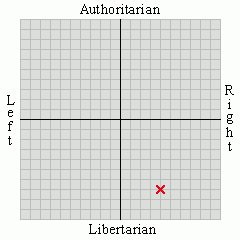>The battleground of British politics is changing. As the economic news continues to get worse, and the Government has to borrow ever more gigantic sums, the central issue for the electorate is no longer: which party can best protect public services? It is: how can the size of the state be reduced?
Or as some of my favourite bloggers have put it, it's no longer a matter of right and left but a matter of libertarian or authoritarian government. However, the Telegraph's concern seems to be more about the cost of a huge state apparatus rather than whether it's good or bad in principle.
That has become a key matter of debate for many reasons. The effects of the credit crunch mean that individuals and families are increasingly concerned about their ability to pay their household bills, never mind their ever-increasing taxes. The colossal sums that Labour has spent on public services have failed to generate the kinds of improvements that were expected. And Labour's failure to set aside money when times were good in order to fund Government spending when times are bad means that, if nothing is done to cut back on the size of the state, Government borrowing will soon escalate to unsustainable levels.
Gordon Brown insisted, as Chancellor, that his watch-word was "prudence", and that he would never spend more than the state's income from tax-receipts generated. His actions have been revealed to be at variance with his words. We are all paying the price of his imprudence.
Well, yes, all true. But really it's just having a dig at the inefficiencies of the state rather than the iniquities that naturally come with it. The financial cost is certainly a relevant part of the debate but let's not ignore forget the state's nasty authoritarian streak, the we-know-better-than-you nannyism and particularly
But is there a glimpse of light at the end of the tunnel?
In [the financial] context, David Cameron's insistence, in his interview with The Sunday Telegraph, that - should the Conservatives win the next election - "the state will be taking a lower share of the national income in taxes", is extremely significant. It demonstrates his commitment, which at some points had seemed in doubt, to diminish the size of the state and to cut the burden of taxation.
Mr Cameron has signalled his intention to cut state spending and taxes. His reluctance to tie himself to definite numbers, or to a definite date when he will start wielding the axe, will disappoint those who hope to see a return of the ideology of the "minimal state" that played such a prominent role in the aspirations of the Conservative party during the Thatcher years.
Mr Cameron clearly understands the importance of having an effective, credible plan for reducing the size of the state. He also realises that the state cannot be reduced overnight: the struggle, not just to diminish the annual growth of state spending but actually to reduce it, will be every bit as protracted and difficult as it was when Margaret Thatcher attempted it in the 1980s (and she managed only to reduce the rate of increase in state spending).
Had seemed in doubt? Still is from where I'm sitting. Look, it's all very well saying Cameron saying this and it's good to hear it, but does he really mean it? The guy tried to ditch the Tories' nasty party reputation by jumping on the eco-bandwagon (drawn by huskies of course) and making noises about keeping Labour's spending plans if elected, and now he seems to think that Gordon has been pissing money up the wall and that the state is costing way to much money. Well, it is of course, but has Dave experienced a Damascene conversion or has he just found a new bandwagon to jump on? I'd like to give him the benefit of the doubt and think this is genuine, or at least evidence that he's falling back on natural Tory instincts (which isn't necessarily good news, but you have to wonder if this is just his latest fad. I'm sure he and his advisors look at what's written in the press and blogosphere and maybe they're sensing a mood of anger at the cost of the state, the waste involved and the abuse of the powers it's granted itself under NuLabGov. The fact that he's only talking about the cost of the state just adds to my scepticism. The Tories are paternalists. Are they genuinely concerned about the big state or do they just want injustice and government interference in the lives of all citizens to be more cost efficient?


















